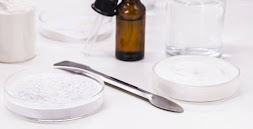Does Benzoyl Peroxide Help With Acne Scars?
NO! Benzoyl peroxide belongs to BHA and is primarily used to treat acne by reducing bacteria and inflammation. While it can help reduce the appearance of active acne, it is not effective in removing acne scars. Almost all dermatologists love it and prescribe it to patients with acne and other problems. It kills bacteria by releasing free radical oxygen species. There is no bacterial resistance with benzoyl peroxide. This is the reason why in acne, we encourage the use of benzoyl peroxide antibiotic combination rather than antibiotic alone.
Scar treatment options may include procedures such as laser
therapy or microdermabrasion, and topical products containing ingredients like
vitamin C or retinoids. It is recommended to consult with a dermatologist to
determine the best scar treatment plan for your specific needs. A little detail
of this is given below after discussing other uses of benzoyl peroxide.
Benzoyl peroxide is
available in 2.5%, 4%, 5%, and 10% strength in gels, creams, lotions, and
washes.
Uses:
Whiteheads and active acne It helps in reducing
whiteheads due to its keratolytic effects. It is helpful in active acne as well
due to its antibacterial properties. How to use: use 2.5% gel twice a day for
only one hour
1)Armpit odor
Bacterial overgrowth Is the cause of bad-smelling armpits. Using benzoyl peroxide soap while bathing helps in reducing odor. Apply the soap and leave it on for 5 mins before washing it off.
2) Smelling feet:
Pitted keratolysis is a common condition that can give a bad odor to feet. Using benzoyl peroxide soaks for 10 minutes helps in improving the condition.
3) Buttock acne
Benzoyl peroxide washes can help in improving
active acne in the buttocks. Do not use it for dark spots as it won't help in
improving the spots once acne has resolved.
4) Back acne
Active acne on the back also improves with
benzoyl peroxide soaps or washes. Short contact 5 % gel also helps if applied
over a small area.
5) Razor bumps
Red bumps in the beard area are common in
those who close shave or do reverse shaving. Using benzoyl peroxide in the
beard area twice a day helps in reducing the bumps.
Side
effects:
It totally depends upon the concentration and
frequency of its use and whether you are sensitive to it or not. If your skin
is very sensitive then this ingredient is not for you. Its side effects are
1) Bleaching effect:
2) It can bleach colored clothes and bed sheets.
3) Redness and irritation may occur. Short
contact therapy can be used for people who cannot tolerate it.
4) Do not use it if damaged the skin barrier, is
irritated, or very dry skin.
5) The use
of topical benzoyl peroxide has not been studied during breastfeeding. Because
only about 5% is absorbed following topical application, it is considered a low
risk to the nursing infant.
Effective treatment of scars:
1)Vitamin C:
2)Retinoids:
The most well-known and researched ingredient in skincare
products. It is mainly used as an anti-wrinkling, anti-aging, and antioxidant and to
remove pimple marks and scars. It increases cell turnover and increases collagen
production.
3)Microdermabrasion:
A procedure performed in the clinic. Microneedles cause new
minute injuries to the skin after which the patient's own plasma is applied to the
injured skin to heal the scars and marks.
4)CO2 Laser resurfacing:
A fractionated co2 laser removes the upper layer of the skin
and the lower layer thus coming upwards. The cell turnover is increased and scars are
gone in a few sessions depending upon the skills of the dermatologist and the availability
of the instrument.








.png)
.png)






